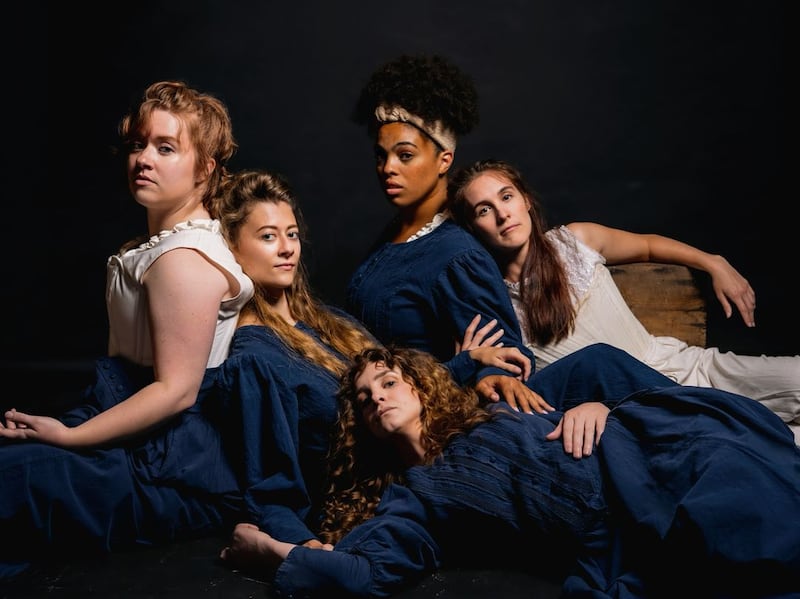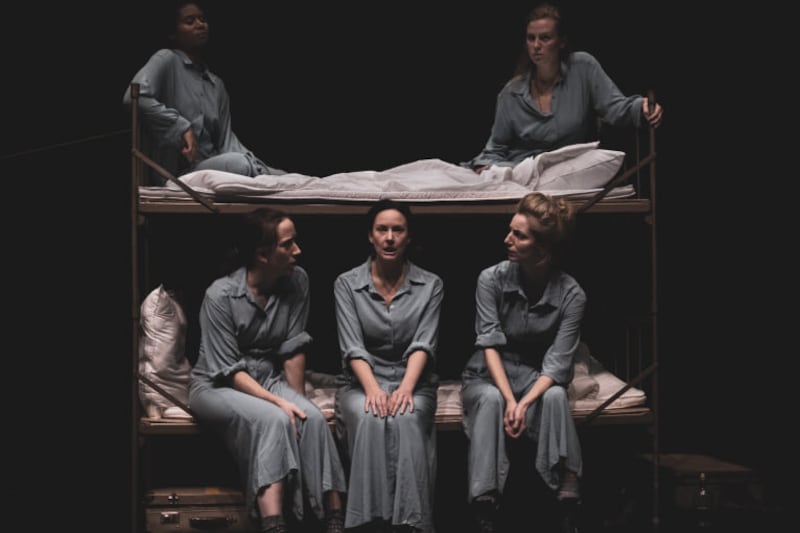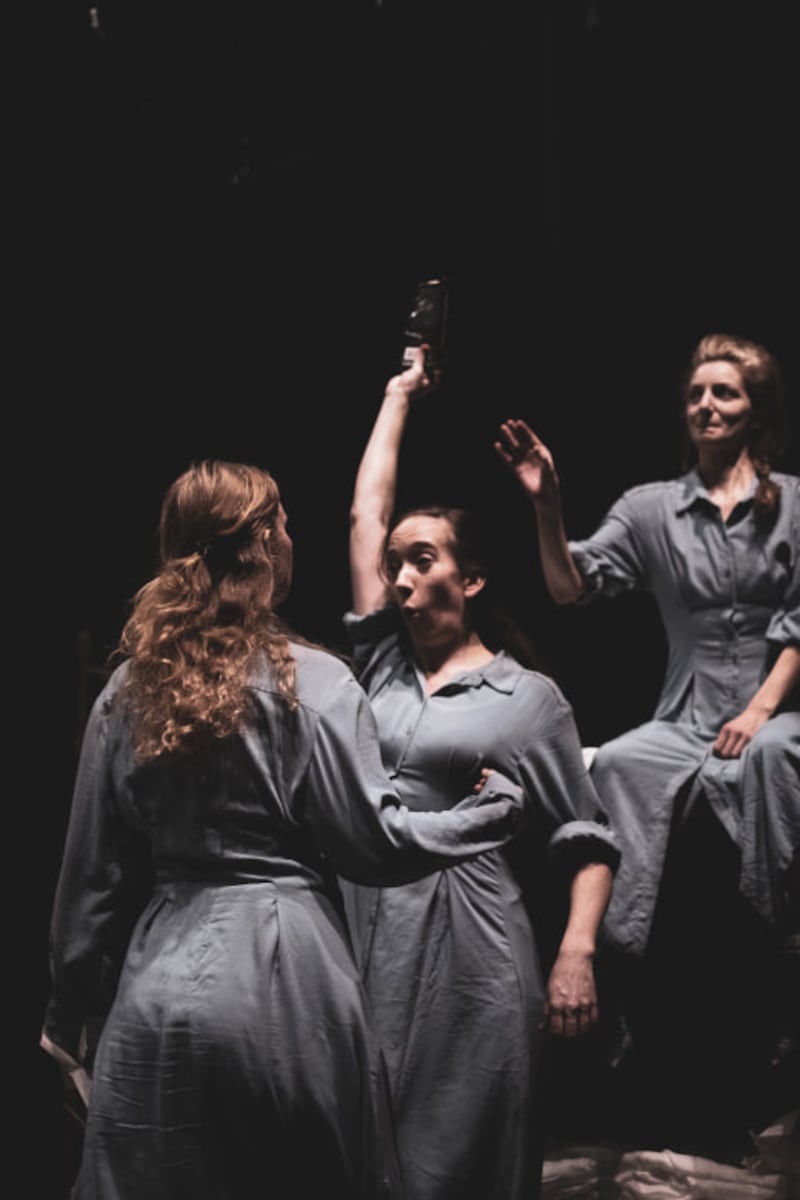AT first glance there doesn’t seem to be much to link the Irish financial crisis of 2008 with five feisty Belfast girls setting out for a new life in Australia in 1850, but as Dundalk playwright Jaki McCarrick will tell you, history has a wily way of changing shape and sneaking up on you again.
It was after taking part in a protest march in Dublin - to vent her anger at the effects of the country’s bail-out programme - that the award-winning playwright began to see parallels between paying bondholders billions of euro as modern-day families were being evicted from their homes, and the way grain was still being shipped out of the country during the Great Famine when people were starving. The result was her play, Belfast Girls, which will enjoy its long-awaited Irish premiere in Belfast at the end of the month.
“When I came across the real story of the ‘Orphan Girls’ – the Female Orphan Emigration Scheme when around 4,000 young Irish women left for Australia between 1848 and 1851 – it made me think about how, after the financial crisis in Ireland, we were having a sort of modern-day famine because bondholders had been bailed out with huge sums of money and the Irish economy eventually crashed,” she says.

“People forget about these things but it was a painful time and so many people I know emigrated to Australia or went to work in the UK... the word ‘famine’ kept coming up in various reports of what was happening, so I was found myself writing Belfast Girls allegorically, but based on true accounts of the women who left Ireland during the famine of the 1800s.”
It is a play not just about emigration, but about “the female experience of the famine” and about how, despite there being documented abuse of the scheme - as well as an “undoubted trafficking element” and degree of self-interest for those involved in its delivery - it was still a lifeline to many young women who escaped the workhouses on a one-way ticket to the New World.
Belfast Girls had to go half way round the world itself in order to come back and be shown in Ireland, but I totally get it. I think there is this thing that we don’t always want to know our own history; it is all too close, in a way
— Jaki McCarrick
As the title infers, Belfast girls were very much as part of this initiative, devised by the third Earl Grey, Henry Grey - the then British Secretary of State for the Colonies - in collaboration with the Australian government. It was designed as a means of reducing pressure on the workhouses and relieving famine at home, while providing Australia with much-needed labour (and, unofficially, wives for a population where men largely outnumbered women).
“There was a group of young women on this scheme who were known as the ‘Belfast Girls’ and during my research they were found to be the most feisty – the riotous ones,” enthuses McCarrick during a writing break from her home in Dundalk. “They were the ones causing lots of trouble, so they were the ones I wanted to write about.

“There was supposed to have been a selection criteria - they were supposed to be sending the ‘crème de la crème’ of starving Irish young women, but there is scholarship to say that some workhouses used the scheme to get rid of what they regarded as ‘fallen’ women.
“These women often came from Belfast, so in my story I weave fact and fiction to tell the tale of the strong, outspoken Belfast girls – not all of whom were orphans or in the ‘proper’ age bracket - who leave for Australia on the Inchinnan ship. I wanted to use their voices to tell the story of the whole 4,000.”
“There was a group of young women on this scheme who were known as the ‘Belfast Girls’ and during my research they were found to be the most feisty – the riotous ones. They were the ones causing lots of trouble, so they were the ones I wanted to write about
— Jaki McCarrick
Hope, alongside self-awareness and self-agency, are the major experiences of these Belfast “survivors” according to McCarrick who has also acted and directed for theatre and has recently written a screenplay version of Belfast Girls which is currently being pitched to producers.
“Given the fate awaiting them if they stayed in Ireland, I really think these young women had no choice but to go on this journey,” she adds. “And wouldn’t you do it, yourself, if you thought you could get out of starving Ireland? I certainly would.”

The play, first developed at the National Theatre Studio in London in 2012 (and shortlisted for the 2012 Susan Smith Blackburn Prize and 2014 BBC Tony Doyle Award), has been performed in countries around the world, but for the first time comes home to Ireland in 2024, with performances scheduled for Dundalk, Belfast, Navan and Drogheda.
A former vocalist with Dundalk electronica pop band, Choice, in the early 80s, McCarrick - who studied Performing Arts at Middlesex University and Creative Writing at Trinity College, Dublin (winning the 2010 Pagatango Prize for New Writing for her play, Leopoldville, set in in an Irish border town in 1990) - is not that surprised at the late welcome home.
“Belfast Girls had to go half way round the world itself in order to come back and be shown in Ireland, but I totally get it,” she says, matter-of-factly. “I think there is this thing that we don’t always want to know our own history; it is all too close, in a way.”
In Northern Ireland there is a domestic violence incident every 16 minutes and in the south of Ireland we have the highest domestic homicide figures in the Europe. My research into all that has led to a play that shows how, post-Troubles, the trauma and fall-out of that period has sort of leaked into the home
— Jaki McCarrick
Happy to be seen as a playwright with a predilection for socialist and feminist issues, there are always topics on the world stage that rage and keep her up at night – the high rates of domestic violence is the subject of her next play, again on attachment to the National Theatre.
“In Northern Ireland there is a domestic violence incident every 16 minutes and in the south of Ireland we have the highest domestic homicide figures in the Europe,” she recounts. “My research into all that has led to a play that shows how, post-Troubles, the trauma and fall-out of that period has sort of leaked into the home.

“I think a playwright has some sort of responsibility to air these things, to shine a light on people who may have been forgotten and maybe make the audience think about these same disenfranchised people who are with us today in different situations throughout the world. If any of these types of stories hit an empathy button and open hearts a little, then we have all done our job.”
- Belfast Girls, produced by An Táin Arts Centre as part of its 10-year anniversary celebrations, is presented by Quintessence Theatre in association with the Lyric Theatre, Belfast, and The North East Network (An Tain Arts Centre, Droichead Arts Centre and Solstice Arts Centre, Navan). It runs at the Lyric from January 31 to February 3





